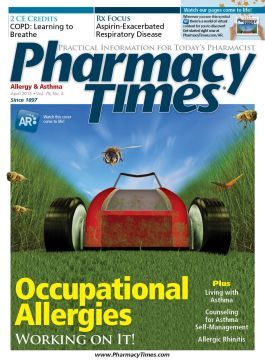Publication
Article
Pharmacy Times
Education Before Medication: Asthma and Allergy
Author(s):
Pharmacists can increase regimen compliance by taking the time to educate patients.

Pharmacists can increase regimen compliance by taking the time to educate patients.
Planning a brown bag event for your patient population does not have to be a time-consuming process. It can simply be offered every day to select patients who you feel require follow-up care after a counseling session. By reviewing prescription medications along with over-the-counter medications, herbal supplements, and vitamins, pharmacists can educate and assess safety and quality of care.
Patients suffering from chronic disease states such as asthma can benefit from suggested brown bag sessions and medication therapy management (MTM). A pharmacist’s involvement may aid with a patient’s understanding of therapy and help increase regimen compliance. Pharmacist intervention can also help with appropriate prescribing of medications, including long-term controller agents and quick-relief medications in patients with asthma.
KM is a 48-year-old female who has been coming to your pharmacy for the past 3 years. Over this time, you have seen her become noncompliant with various drug regimens due to her multiple conditions. You noticed in your last counseling session that KM appears short of breath and does not have as much energy as she used to have. She seems negative about her therapy and is worried about the financial impact of her disease states. You ask KM if she would be interested in participating in a brown bag session. This will allow her to maximize the use of her medications and possibly have a positive financial impact. KM appreciates the opportunity to talk with you in depth, one-on-one. She schedules a time with you tomorrow to bring in all of her medications.
Upon reviewing KM’s medication profile at your pharmacy, you find the following:
- Enalapril 10-mg tablet daily—prescribed by Dr. Z
- Atorvastatin 40-mg tablet daily—prescribed by Dr. Y
- Montelukast 10-mg tablet daily—prescribed by Dr. X
- Albuterol 1 to 2 puffs by mouth every 4 to 6 hours as needed (flagged for overuse/ early refills for the past 4 months)— prescribed by Dr. Y
- Fluoxetine 20-mg capsule daily—prescribed by Dr. Y
When KM comes in for her scheduled appointment, you notice the following additional medications in her brown bag:
- Flunisolide nasal spray 1 spray into each nostril once daily (filled at competitor pharmacy 3 months ago)—prescribed by Dr. Z
- OTC multivitamin daily
- Loratadine 10 mg daily (various OTC generic brand boxes in her bag that are unopened)
- OTC acetaminophen 500 mg every 4 to 6 hours as needed
- OTC diphenhydramine 25-mg capsules (expired)
- OTC Primatene Mist inhaler (expired)
After reviewing the medications in KM’s possession, you realize KM would benefit from an MTM session, and you schedule a follow-up appointment. An MTM session will allow you to further communicate with KM’s health care providers, obtain lab values/pulmonary function tests, and further evaluate KM’s medical goals, especially related to her asthma.
An MTM session will also give you the opportunity to offer in-depth asthma and allergy education, as requested by KM. In the meantime, you have questions surrounding her medications and some suggestions:
- You suggest to KM that you contact her prescriber Dr. Z regarding her flunisolide nasal spray. You wonder if an inhaled corticosteroid is the best agent for her allergic rhinitis and if the directions are correct. At this time, KM tells you she has never had pulmonary function tests and her asthma and allergies have always been “self-diagnosed.”
- KM’s enalapril directions instruct her to take 1 tablet daily. Yet you notice when you look in the bottle that the tablets are cut in half and KM’s compliance has been off in your computer system. You ask her about this and she tells you she was not following directions. She cuts her pills in half as a cost-saving measure and tells you her provider Dr. Z is unaware of her manipulation. You notify the provider immediately after you note her blood pressure is well above 130/80.
- You ask KM how long she has been feeling short of breath. She explains that with the “change of seasons” and her new volunteer job at the local Humane Society that her allergies “act up all the time.” You explain that some of her medications come with unnecessary side effects such as drowsiness and some are expired. You also would like to refer her to 1 provider for consistent care to help her manage her allergy and asthma symptoms. KM admits she doesn’t really know how to use inhalers, as no one has taught her. You explain that once the proper medications are prescribed, you will set aside time to train KM and watch her inhaler technique.
Dr. Drury works as a clinical pharmacy specialist in Chicago, Illinois, and Milwaukee, Wisconsin. She earned her doctor of pharmacy from Midwestern University College of Pharmacy in 2007. In addition to her current work, she is a blogger for PharmacyTimes.com.







